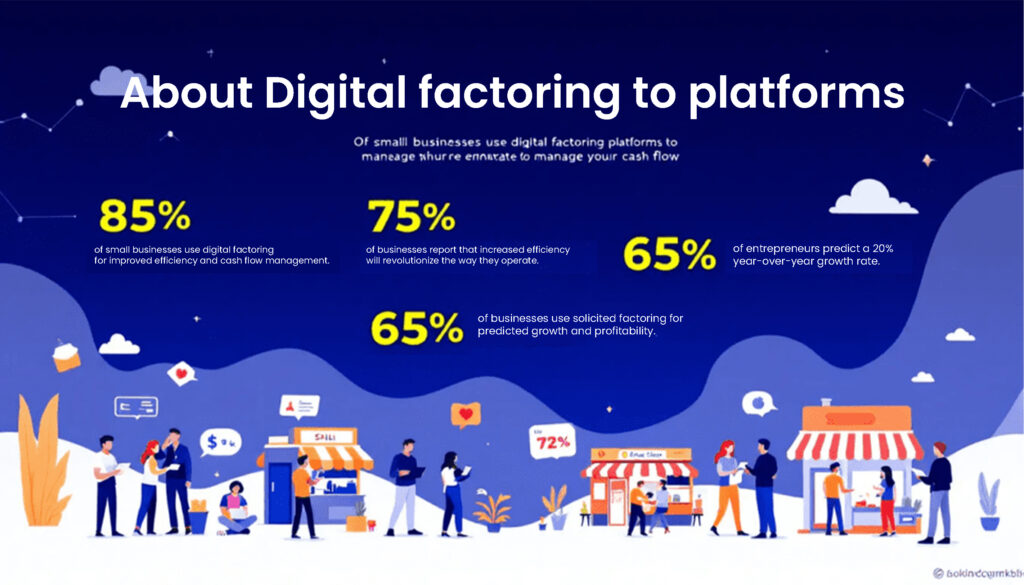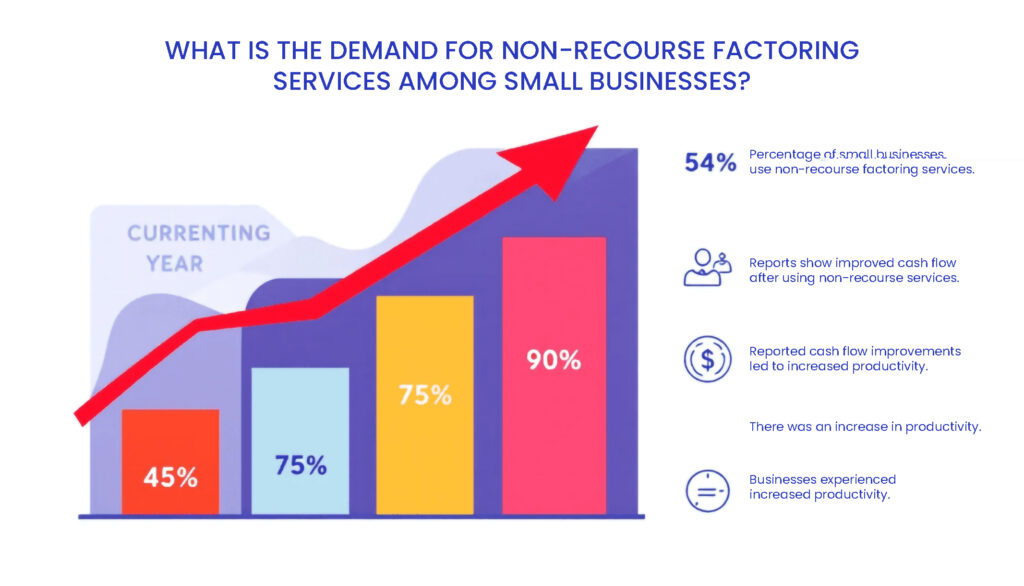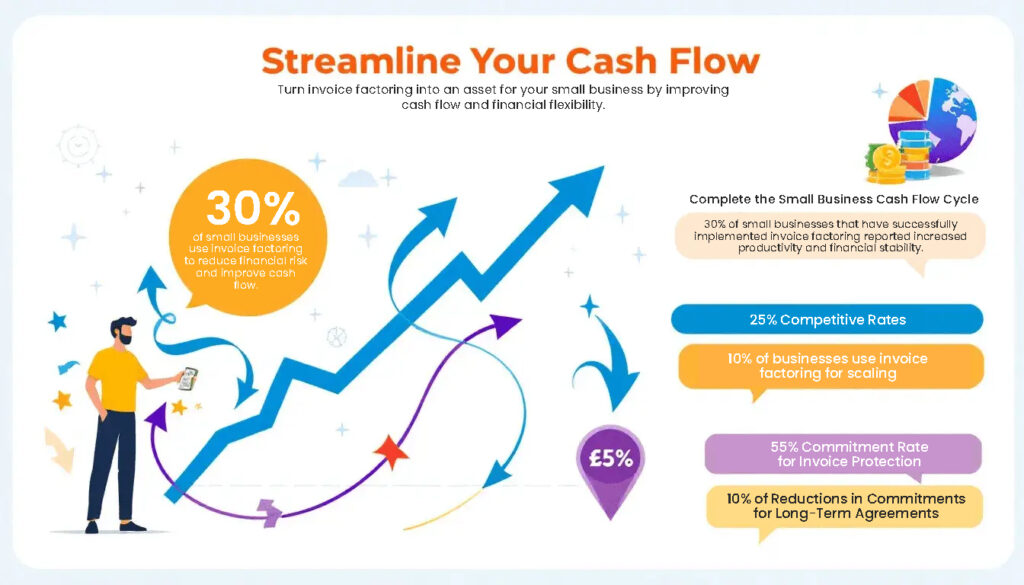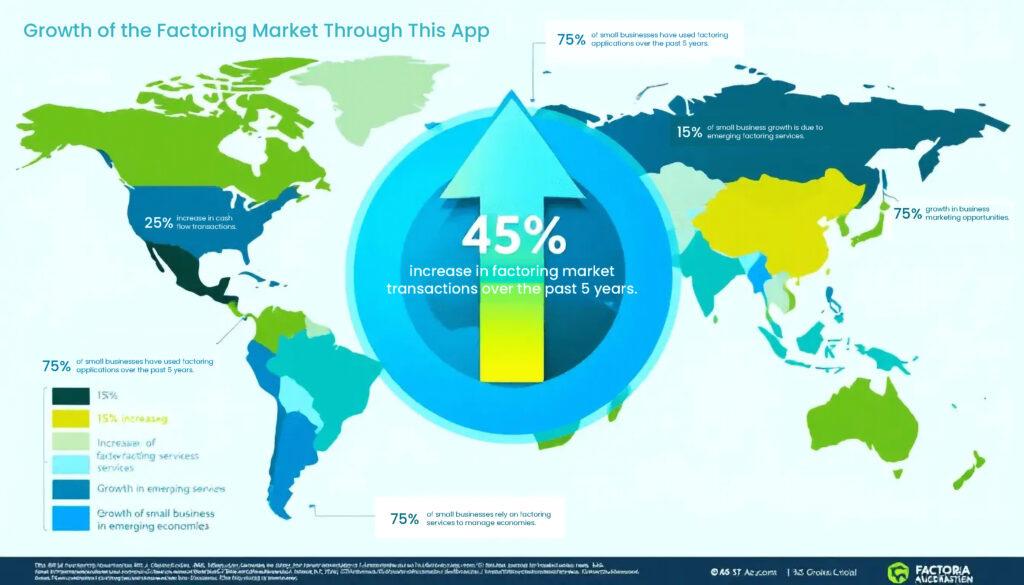Accounts receivable financing for small businesses
Are you looking forward to the 2025 factoring trends for small business owners? This article covers the major developments impacting how small businesses manage working capital through invoice factoring business financing. Discover the emerging technologies and market changes set to shape the future.
Key Takeaways
- The rise of digital factoring platforms enhances cash flow for small businesses with faster funding and improved liquidity through fintech partnerships.
- AI and machine learning improve accuracy and risk management in factoring, enabling real-time analytics and enhancing fraud detection capabilities.
- Non-recourse factoring, which alleviates the risk of unpaid invoices while offering greater financial flexibility, is increasingly favored by small businesses.
Please read the top strategies to grow a B2B business.
The Rise of Digital Factoring Platforms

Digital factoring platforms showcasing various small businesses engaging with technology
The digital revolution has transformed invoice factoring, with new digital platforms enhancing transparency and speeding up the process. These platforms allow small businesses to access funds more quickly, minimizing the wait between invoice issuance and payment.
Factoring companies are partnering with fintech firms to enhance liquidity and streamline operations. These partnerships combine financial expertise with technological innovation, resulting in a more robust, agile, and user-friendly business experience.
For small business owners, digital platforms translate to faster funding and better cash flow management. Companies like Bankers Factoring provide same-day funding once the account is set up, offering rapid access to working capital. This can be a game-changer, enabling businesses to seize opportunities and maintain steady operations without the delays of a traditional bank loan.
Technology keeps factoring fees down, even in our high-interest rate environment, opening up more choices in small business financing.
AI and Machine Learning in Accounts Receivable Factoring
Artificial intelligence (AI) and machine learning are transforming invoice factoring by analyzing data and predicting risks in real-time. AI-driven systems automate data extraction and validation, significantly reducing manual efforts and minimizing errors.
AI in factoring offers more than speed and accuracy. Real-time analytics help businesses track payment trends, identify bottlenecks, and make informed decisions. This insight is invaluable for small businesses managing cash flow. AI’s real-time credit checks also reduce the risk of bad debts, ensuring that only likely-to-be-paid invoices are factored.
AI is also making significant strides in fraud detection by analyzing invoice data patterns to spot anomalies, thus safeguarding businesses against potential losses. These advancements enhance the security of factoring services and build trust between invoicing factoring companies and their clients.
Blockchain’s Impact on Invoice Factoring
Blockchain technology promises to revolutionize invoice factoring by providing unprecedented security and efficiency. It streamlines invoice verification, reduces fraud risk through real-time visibility and immutable records, and ensures all parties have access to the same information, thus eliminating discrepancies and enhancing trust.
Smart contracts on blockchain platforms trigger automatic payments upon invoice verification, speeding up transaction processing. This automation reduces the time and cost of manual processes, making invoice factoring more efficient and cost-effective. Additionally, tokenizing invoices allows businesses to sell receivables to multiple investors, enhancing funding accessibility.
Factoring companies are using crypto-backed liquidity pools to quickly access funds for purchasing invoices, improving operational efficiency. Integrating blockchain technology allows these companies to offer faster, more secure, and transparent services, benefiting small businesses aiming to improve cash flow.
Increased Demand for Non-Recourse Factoring

Non-recourse factoring is becoming popular among small and medium-sized enterprises (SMEs) as a preferred financing option. Unlike recourse factoring, where small business owners retain the risk of uncollected invoices, non-recourse factoring transfers this risk to the factoring company, providing full credit coverage and alleviating the stress of unpaid invoices.
The flexibility and absence of long-term contracts make non-recourse factoring attractive for businesses seeking financial agility. SMEs increasingly turn to it as a viable alternative to traditional financing methods, often burdened with stringent requirements and inflexible terms. However, businesses must carefully review criteria and terms to avoid pitfalls that could convert non-recourse offers into recourse factoring.
For small businesses facing cash flow shortages, non-recourse factoring provides a safety net, ensuring continuous operations without worrying about bad debts. This type of factoring can significantly improve cash flow, allowing companies to focus on growth and expansion without financial constraints, even when dealing with cash flow gaps.
Please read how to find working capital.
Tailored Solutions for Industry-Specific Needs
In today’s diverse business environment, one-size-fits-all solutions rarely suffice. Factoring companies offer tailored solutions to meet various industries’ unique cash flow needs. For instance, the growth of e-commerce has led to specialized factoring services for smaller trucking businesses, addressing their specific financial challenges.
Different sectors face unique financial pressures requiring customized approaches. Construction firms benefit from contract and project financing to manage cash flow tied to project milestones, while staffing agencies need solutions to handle high upfront costs and delayed client payments.
Tailored factoring solutions provide businesses with the specific support needed to navigate their unique financial landscapes through innovative solutions.
Flexible Payment Terms and Competitive Factoring Rates

In small business invoice factoring, flexible payment terms and competitive rates are crucial for small businesses. Modern invoice factoring companies offer adaptable repayment plans that align with fluctuating cash flow needs, which is essential for effective cash flow management, especially during financial instability. An invoice factoring company can provide the necessary support to navigate these challenges, including considerations around outstanding invoices and invoice factoring cost.
Additionally, understanding how invoice factoring works can benefit your business, which is vital for making informed decisions.
Competitive rates are also crucial. While many factoring companies advertise low rates, businesses must consider the total factoring cost, including hidden fees that can impact overall expenses. Progressive factoring companies use advanced technologies to offer better cash advances, enabling quicker access to a larger portion of invoice value.
For businesses seeking to improve cash flow without traditional bank loans, invoice factoring is a practical alternative for business financing. Choosing the proper agreement provides immediate cash flow, improved financial stability, and a partner committed to their success.
Enhanced Customer Support and Service
Customer support is crucial in the factoring industry, with companies constantly enhancing their service offerings. Advanced verification technologies minimize fraud risks and improve the customer experience. Effective communication and empathy are key strategies for managing client relationships, ensuring businesses feel supported during challenging times.
Real-time reporting and analytics from integrated systems offer valuable insights for informed decision-making. By providing transparency and clarity, these tools improve operational efficiency and foster stronger customer relationships.
Integration with Business Management Software
Integrating invoice factoring with business management software benefits small businesses by automating invoice submissions and streamlining financial reporting. This reduces the administrative burden, minimizes data entry, and improves cash flow management, enhancing operational efficiency and allowing businesses to focus on growth.
Effective integration increases customer satisfaction by making operations more streamlined and transparent. A user-friendly factoring interface enhances client experiences, simplifying the management of invoices and funding requests.
Choosing the right software for integration and focusing on customization, scalability, and security to meet specific business needs is crucial.
Expansion of Global Factoring Markets

The expansion of global factoring markets and growth opportunities for small businesses
The global factoring market is growing significantly, creating new business opportunities worldwide. In 2023, it grew by 3.6%, reaching $3,950 billion. The U.S. market is projected to grow significantly, expected to reach about $288 billion by 2030.
Emerging markets like South Africa and regions like Asia-Pacific are showing strong growth rates. Blockchain technology is expected to facilitate faster, cheaper cross-border factoring, eliminating bank transfer delays and enhancing global trade.
For small business owners, this means more opportunities to expand internationally and seize growth opportunities in an interconnected economic landscape.
Summary
The landscape of invoice factoring is rapidly evolving, driven by technological advancements and changing market dynamics. From the rise of digital platforms and AI integration to adopting eco-friendly practices and global market expansion, these trends reshape how small businesses manage their cash flow.
Staying updated with these trends is crucial for businesses looking to improve their financial stability and seize new growth opportunities. By leveraging the latest developments in the factoring industry, small businesses can navigate cash flow challenges more effectively and position themselves for long-term success.
Frequently Asked Questions
What is invoice factoring?
Invoice factoring is a business financing option allowing businesses to sell their unpaid invoices to a factoring company for immediate cash, thereby improving cash flow. This invoice financing approach can help you manage expenses more effectively by providing quicker access to funds.
How do digital factoring platforms enhance the factoring process?
Digital factoring platforms significantly enhance the process by providing increased transparency and faster access to funds, improving cash flow management. This efficiency allows businesses to make timely financial decisions and optimize their operations via invoice financing.
What are the benefits of non-recourse factoring?
Non-recourse factoring effectively mitigates the risk of unpaid invoices, providing full credit coverage and allowing businesses the flexibility they need without the burden of long-term contracts. This enables companies to focus on growth while offloading the risk of bad debt.
How does AI improve invoice factoring?
AI enhances invoice factoring by automating data extraction, increasing efficiency, improving fraud detection and offering real-time analytics for informed decision-making. This leads to a more streamlined and secure factoring process.
Why is integrating factoring services with business management software important?
Integrating factoring services with business management software is crucial because it automates invoice submissions and streamlines financial reporting, ultimately improving cash flow management and operational efficiency. This connection enables businesses to focus on growth while maintaining financial stability with Bankers invoice factoring service.
